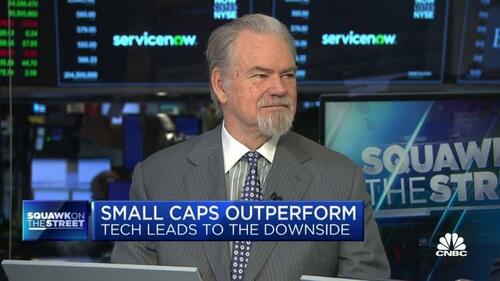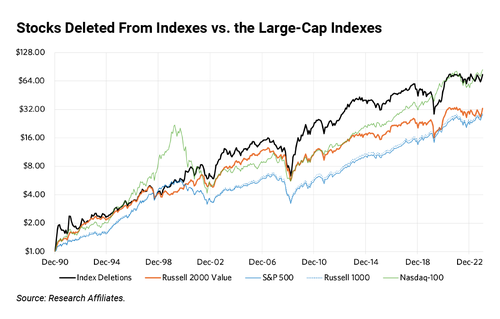


When stocks are ejected from market-cap-weighted indexes, swooping in to load up on them -- and hold on to them -- can pay off nicely, according to a new paper from Newport Beach, California-based Research Affiliates LLC.
"Once dropped by the index, there is a silver lining for these stocks...they, on average, outperform the market over the next several years, creating a compelling opportunity for investors," said Research Affiliates chairman Rob Arnott, who co-authored the study with the firm's research VP Forrest Henslee. They also found that, over the year after being booted from the indexes, deleted stocks have historically outperformed the stocks that replaced them.
This strategy isn't about making a quick profit by catching a bounce when the price-pressuring effect of index funds' mandatory selling subsides. Rather, it assumes the investor holds on to the shares for five years. Had an investor started employing the strategy in 1991, he'd have grown his initial investment by about 74x.
To track the strategy, Research Affiliates has launched the Research Affiliates Deletion Index (NIXT). While based on the research methodology, the NIXT index does have a tweak in the form of a quality screen that includes a company's debt, total payout ratio and net payout ratio -- with stocks falling in the bottom quintile rejected. The index uses an equal weighting and annual rebalancing. No ETF yet tracks it, so, for now, it's a do-it-yourself opportunity.
Tracking rejects from the S&P 500, Nasdaq-100 and Russell 1000, the strategy is ultimately a small-cap value play:
Stocks that get dumped are by their nature small and cheap. Between 1991 and 2022, deletions traded at a 26% discount to the S&P 500 in terms of their price-to-earnings ratio while additions fetched an 83% premium. -- Wall Street Journal
"When an index producer adds or drops stocks from the index, they will inevitably add stocks that are popular, beloved, and expensive and drop stocks that are unloved and cheap," said Arnott. The strategy's small-cap tilt springs from the fact that many index deletions are sparked by companies no longer making the large-cap cut.
Some key observations from the study:
"It makes sense that the booted companies would become undervalued and bounce back," notes Charles Robtlut at the American Association of Individual Investors. "It also makes sense to overlay a quality filter because some companies are booted from the indexes because they are no longer good companies."
The Journal credits Arnott as a "luminary in the world of finance nerds constantly trying to build a better mousetrap," noting that a 2005 paper he co-authored sparked the smart beta trend.


